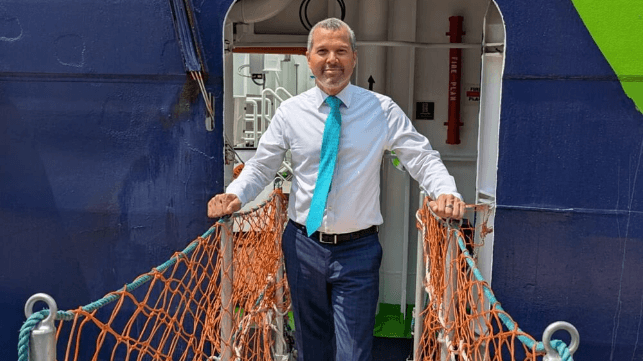IMO Secretary-General Calls for Ambitious Investments in Decarbonization

The global shipping industry must invest hundreds of billions of dollars in new technologies and alternative fuels to achieve net-zero emissions, maritime leaders said at an international forum in Monaco last weekend.
Speaking at the Blue Economy Finance Forum on Sunday, IMO Secretary General Arsenio Dominguez said that no matter what happens with new global carbon regulations, the sector's decarbonization effort will require stepped-up cooperation between shipping companies, fuel producers and port operators worldwide.
"Regulations alone cannot do the job," Mr. Dominguez told attendees. "We need technological development and we need alternative fuels. And that can only happen in one way — with investment."
The shipping industry burns roughly 350 million tons of fuel oil annually and accounts for nearly 3 percent of worldwide carbon emissions. It is on the verge of a major regulatory change: Under the new carbon framework agreed at MEPC 83, all ocean-going vessels engaged in international trade will be subject to mandatory emissions standards.
Industry executives acknowledged the scale of the challenge ahead. Christine Cabau-Woehrel, executive vice president of the French shipping giant CMA CGM, described the transition as "a complete transformation of the shipping business."
"It will take ecosystems to do it together," Ms. Cabau-Woehrel said. "It will be a long and difficult journey, but we want to be running in front."
The container shipping sector has already committed $150 billion to decarbonization, according to Joe Kramek, president of the World Shipping Council. At least 200 boxships can run on zero or near-zero emission fuels, while nearly 80 percent of new orders for container ships and vehicle carriers will have similar capabilities.
"The liner industry has already invested $150 billion in decarbonization," Mr. Kramek said, speaking at the forum. "It is unprecedented for the transport sector. But we need the fuel supply — it's a tremendous investment opportunity."
The industry faces significant logistical hurdles beyond developing cleaner fuels. Port infrastructure worldwide will need major upgrades to safely store and distribute alternative fuels to visiting ships. Nearly half a million seafarers will require new training by 2030 to handle advanced fuel systems and safety protocols.

that matters most
Get the latest maritime news delivered to your inbox daily.
The new regulations represent a two-pronged approach: establishing global fuel standards that disincentivize greenhouse gas intensity while creating economic incentives for early overcompliance. The rules will be reviewed every five years, with emission limits tightened progressively over time.
Mr. Dominguez emphasized that the maritime sector could no longer rely solely on voluntary commitments and diplomatic statements. "It's time for us to move from the statements and commitments into actions," he said. "That's what we've been doing at IMO for over a decade. That is what we are going to demonstrate again in October, and we will not stop there."
